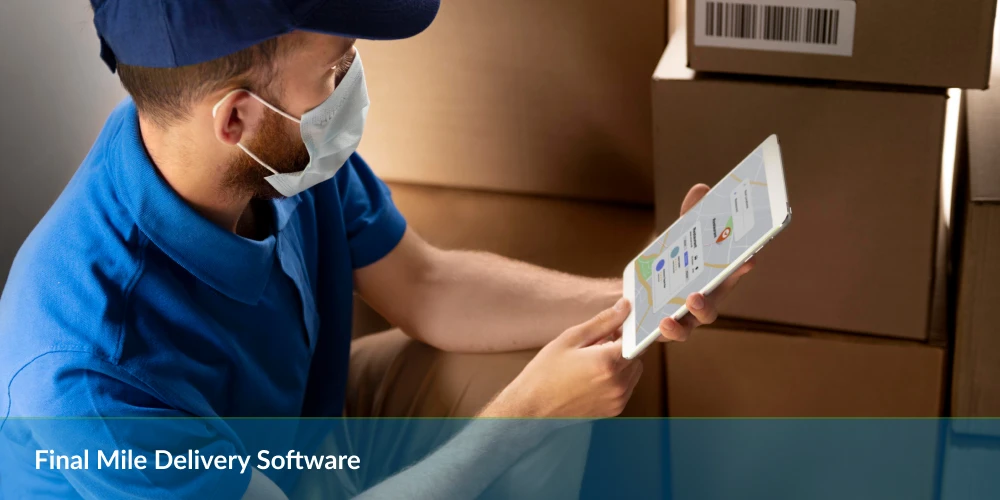Table of Contents
In today’s contemporary logistics landscape, logistics software solutions form the fundamental framework for streamlined and agile third-party logistics (3PL) operations. Speed, accuracy, and scalability define market leaders today, and understanding the essence of robust logistics software is paramount. These digital tools provide the much-needed torque for your 3PL business, facilitating seamless operations from warehouse management to last-mile delivery.
For 3PL businesses, logistics software’s role goes beyond tracking and data entry. It is a comprehensive solution that integrates all operational facets, streamlining complex logistics processes and enabling real-time decision-making. These systems are designed to power through challenges, ensuring that logistics becomes a seamless, adaptive, and cost-effective component of your business.

At the core of effective logistics software for 3PLs lie pivotal components, including inventory management, order fulfillment, carrier integration, transportation management, and real-time analytics. These elements function synergistically to magnify visibility, optimize resource allocation, and enhance the overall customer experience, ultimately driving business growth and profitability.
Optimizing 3PL Efficiency with Advanced Warehouse Management Systems (WMS)
Third-party logistics (3PL) providers are the backbone of today’s supply chain, and the efficiency of their operations hinges significantly on the capabilities of their Warehouse Management Systems (WMS). These sophisticated platforms are more than just software solutions; they are transformative tools that enhance every aspect of warehouse functionality. With the power to make or break a logistics company’s success, understanding the Impact of WMS is crucial.
The Importance of WMS in 3PL Operations
At the core of any successful 3PL operation lies a robust WMS, providing real-time insights and control over inventory that’s pivotal for maintaining a competitive edge. These systems streamline processes, minimize errors, and synchronize complex logistics tasks, facilitating swift and accurate order fulfillment.
Features of WMS that Enhance Warehouse Efficiency and Inventory Management
- Automated Inventory Tracking: Reduces the likelihood of human error and ensures accurate stock levels.
- Barcoding and RFID Scanning: Speeds up processing and retrieval of goods, making inventory management a breeze.
- Picking and Packing Optimization: Improves order fulfillment efficiency with directed picking, packing, and shipping.
- Real-time Data Analysis: Offers actionable insights to enhance decision-making and proactive response to market demands.
Integrating WMS with Other Logistics Software for Seamless Operations
The true potential of a WMS is unleashed when it works in unison with other logistics software solutions, such as Transportation Management Systems (TMS) and Customer Relationship Management (CRM) tools. Integration facilitates a seamless flow of information across all operational channels. It equips 3PL providers with the capabilities to handle increased volume, complexity, and the expectation for fast, transparent service delivery that defines the modern supply chain.
Streamlining Shipments with Transportation Management Systems (TMS)
Transportation Management Systems (TMS) have become indispensable tools in modern shipment process management. These systems allow logistics and supply chain professionals to optimize the planning, execution, and optimization of physical goods movements.
Overview of TMS and Its Functionality in Shipment Process Management
A TMS serves as the backbone of a shipment process by facilitating the exchange of information between all entities involved in the transportation flow. It assists in route planning and optimization, load building, and carrier management. It provides real-time tracking and freight bill audit and payment. A TMS’s efficacy is evident in its ability to reduce transportation costs and improve shipment efficiency.
How TMS Solutions Help 3PLs Optimize Carrier Selection and Freight Costs
Third-party logistics Providers (3PLs) reap significant benefits from leveraging TMS solutions. A TMS can use sophisticated algorithms to help a 3PL choose the best carrier based on transit times, rates, and service levels. This is instrumental in managing freight costs effectively while ensuring reliable delivery schedules.
- Enables efficient carrier rate comparisons
- Facilitates the consolidation of shipments to save costs
- Allows for dynamic rerouting of in-transit shipments to meet changing demands
Role of Inventory Management in 3PL Success
Accurate inventory management is vital for third-party logistics (3PL) providers to uphold efficiency, satisfy customer demands, and maintain a competitive edge. Effective inventory control is the foundation that supports the complex structures of warehousing, fulfillment, and distribution within the logistics industry.
The Necessity of Accurate Inventory Management for 3PLs
To achieve operational excellence and client satisfaction, 3PLs must ensure real-time inventory accuracy. This precision allows for responsive and reliable service delivery, which is critical in an industry where client trust is paramount. The ability to track stock levels, predict inventory needs, and mitigate the risks of overstocking and stockouts is directly linked to the robustness of a 3PL’s inventory management system.
Techniques and Software Solutions for Ideal Inventory Control
Investing in cutting-edge logistics software solutions is essential for optimizing inventory control. Modern software enables 3PLs to implement techniques such as just-in-time (JIT) inventory, real-time data analytics, and automated reordering systems. These tools streamline inventory management processes, reduce waste, and improve supply chain efficiency.
Best Practices for Inventory Management in Warehousing and Distribution
- Regular Audits: Conducting frequent physical counts and reconciliations ensures database accuracy.
- Smart Forecasting: Utilize predictive analytics to anticipate demand changes and adjust inventory accordingly.
- Centralized Management: Using a single platform to manage all inventory data simplifies processes and reduces errors.
- Location Tracking: Implementing an effective system for tracking inventory locations within warehouse spaces can drastically reduce picking errors and save time.
Perfecting the Order Fulfillment and Distribution Process
Maximizing order fulfillment and distribution efficiency is a cornerstone of logistics software solutions, especially for Third-Party Logistics (3PL) providers. Properly integrating and implementing sophisticated software tools can transform a struggling distribution system into a streamlined, reliable, and highly responsive operation.
The Order Fulfillment Lifecycle in a 3PL Context
The fulfillment lifecycle within a 3PL setup involves numerous stages—from order receipt and processing to picking, packing, shipping, and return management. Tailoring these steps effectively via logistics software solutions ensures swifter turnaround times, fewer errors, and, ultimately, higher client satisfaction.
Technologies Driving Efficiency in Distribution — Barcoding and RFID Integration
Logistics providers can significantly speed up inventory handling processes by harnessing the power of technologies like barcoding and Radio Frequency Identification (RFID). These technologies allow for real-time tracking of products through the distribution center, leading to improved accuracy and reduced overhead costs.
Software Solutions to Streamline the Fulfillment Process, including Cross-Docking and Transloading
Utilizing advanced logistics software solutions specializes in optimizing tasks such as cross-docking and transloading. Such processes minimize handling and storage, hastening the order fulfillment cycle and enhancing the entire distribution chain. This section of the ecosystem is particularly critical, with software enabling more intelligent decision-making and allocation of resources.
- Cross-Docking: This technique involves unloading products from incoming vehicles and directly loading them onto outgoing ones with minimal storage in between, trimming down delivery times.
- Transloading: Transloading allows for the transfer of goods from one mode of transportation to another, optimizing the efficiency of each leg of the journey and often reducing costs.
The relentless pursuit of perfection in the order fulfillment and distribution process via innovative logistics software solutions is not merely an option for 3PLs; it’s imperative for remaining competitive in the modern logistics landscape. Embracing these technologies can lead to streamlined operations, better resource utilization, and, most importantly, customer delight.
Achieving Supply Chain Visibility and Analytics
Visibility within supply chain operations is essential for any third-party logistics (3PL) provider aiming to stand out in the competitive market of logistics software solutions. Without it, inefficiencies thrive, and customer satisfaction suffers. Achieving comprehensive visibility requires dedication and the right analytical tools.
The Critical Nature of Visibility in 3PL Operations
Visibility is not just about tracking; it’s about the transparency and accessibility of data across every touchpoint in your supply chain. From the warehouse floor to the final delivery, having real-time insights into the status of goods is non-negotiable. It empowers businesses to anticipate problems, communicate effectively with customers, and manage resources efficiently.
Analytical Tools for Enhanced Decision-making and Performance Tracking
Incorporating advanced analytical tools into logistics software solutions transforms raw data into actionable intelligence. Real-time dashboards, predictive analytics, and performance metrics allow 3PL providers to swiftly make informed decisions, optimize operations, and consistently meet Key Performance Indicators (KPIs).
Integrating Analytics for a Proactive Approach to Logistics Management
Analytics integration is the stepping stone towards a proactive logistics management style. By anticipating trends and potential disruptions, logistics software empowered with analytics moves beyond reactive problem-solving. It aligns business activities with strategic goals, paving the way for innovation and continuous improvement in the supply chain.
- Real-time dashboards ensure immediate awareness of the supply chain status.
- Predictive analytics forecast future trends and prepare the supply chain for any eventualities.
- Performance metrics guide 3PLs in refining processes for maximized efficiency and profitability.
Benefits of Carrier Integration and Freight Auditing
Streamlining supplier interaction through carrier integration and automating freight auditing are two critical components that logistics software solutions offer to enhance third-party logistics (3PL) operations. By leveraging these features, 3PLs can significantly increase efficiency, cost-effectiveness, and service quality. Let’s delve into the specific advantages of these powerful tools.
Streamlining Supplier Interaction Through Carrier Integration
Carrier integration is a game-changer for logistics companies. It facilitates seamless communication and data exchange between the 3PL and its carriers. This integration allows for real-time updates on shipping status, tracking, and inventory levels, ultimately leading to the following:
- Reduced manual data entry errors
- Enhanced shipment visibility and control
- More efficient use of transportation resources
- Faster response times to customer demands
By consolidating carrier information into a single platform, logistics providers can streamline operations and make more informed decisions, reducing delays and improving the overall quality of service.
Automating Freight Auditing to Identify Savings and Improve Accuracy
Automating the freight auditing process is another robust feature of logistics software solutions. It drastically reduces the time and effort required to audit freight invoices manually. This system:
- Quickly identifies billing discrepancies and opportunities for cost savings
- Ensures accurate freight charge calculations
- It helps avoid overpayments and aids in recovering overcharges
- Improves financial reporting and accountability
Automated freight auditing is an asset for financial management within logistics operations. It guarantees that every dollar spent on transportation is tracked and optimized.
Understanding these benefits is critical for any logistics provider investing in logistics software solutions. Carrier integration and freight auditing are not just tools; they represent strategic investments that drive effective supplier interaction and financial health for 3PL businesses.
Enhancing Customer Relationships with CRM Tools
Customer Relationship Management (CRM) systems play a pivotal role in logistics, offering a dynamic approach to managing customer interactions and ensuring the highest level of service. When integrated with logistics software, CRM tools provide a comprehensive experience that bridges the gap between suppliers and customers, fostering seamless communication and optimized service delivery.
Role of Customer Relationship Management (CRM) in Logistics
Effective CRM implementation within logistic frameworks expands beyond simple customer service. It is the blueprint for relationship building, customer retention, and sales growth. By understanding each client’s unique requirements and preferences, logistics providers can tailor their services to meet demands with greater precision and personalization.
Integrating CRM with Logistics Software for a Unified Supplier and Customer Experience
Combining CRM tools with logistics software solutions is not just an additive process; it’s a transformative one. The integration ensures that data flows seamlessly across the supply chain, providing real-time insights into customer behavior and preferences. This intel, in turn, enables logistics companies to anticipate needs and solve problems before they arise, ensuring a smooth, error-free experience for both suppliers and customers.
Optimization Strategies for 3PLs
For third-party logistics (3PL) providers, the relentless pursuit of efficiency is critical to staying competitive in a fast-paced market. By implementing robust optimization strategies, 3PLs can improve operational efficiency and service quality. Below, we discuss key optimization tactics that can propel your logistics operations to the next level.
Route Planning and Optimization for Efficient Movement of Goods
Efficient logistics are predicated on intelligent route planning and optimization. Logistics software solutions can determine the most cost-effective routes by leveraging advanced algorithms and real-time data. This saves valuable time and fuel and reduces wear and tear on transportation assets, enabling 3PLs to deliver goods swiftly while minimizing environmental Impact.
Yard Management Solutions: Orchestrating Movements within the 3PL Facilities
Coordinating the movements of trucks, trailers, and loading dock activities can be complex. Yard management solutions are essential for improving this flow within 3PL facilities. These systems reduce congestion, streamline operations, and speed up turnaround times, directly contributing to improved productivity and profitability.
The Importance of Scalability and Cloud-based Solutions for Growing 3PL Businesses
As 3PL companies expand, they require scalability in their logistics software solutions. Cloud-based platforms offer the flexibility to grow without significant upfront investments in infrastructure, ensuring 3PLs can effortlessly scale up or down based on demand fluctuations. The cloud’s scalability is a definitive factor for 3PLs aiming to adapt swiftly to market changes and customer demands.
- Enhanced Collaboration: Cloud-based systems facilitate improved collaboration between staff, partners, and clients.
- Accessibility: They allow real-time access to data and systems from anywhere, anytime.
- Security and Reliability: Robust data protection measures and high uptime rates ensure continuous operation.
Adopting these optimization strategies allows 3PLs to enhance performance, support growth, and maintain a cutting-edge in the dynamic logistics sector.
Embracing eCommerce Integration and Multichannel Support
The eCommerce boom has created opportunities and challenges for third-party logistics (3PL) providers. As businesses strive to meet consumer demands for fast and reliable delivery, logistics companies must adapt to efficient software for logistics management for seamless integration and support of multiple sales channels.
The Rise of eCommerce and its Impact on 3PLs
The meteoric Rise of eCommerce has redefined the landscape for 3PLs. The surge in online shopping has precipitated a need for logistics providers to offer agile and scalable solutions that can handle an increase in order volume and provide swift order processing, all while maintaining accuracy and customer satisfaction.
Software Solutions for Synchronizing Multiple Sales Channels
In response to the multichannel challenge, sophisticated logistics software solutions have emerged. These systems are designed to synchronize inventory, orders, and customer data across all sales channels—online, in-store, or via marketplaces—ensuring that all information is up-to-date and consistent wherever customers shop.
Challenges and Opportunities in Multichannel Order Fulfillment
Although multichannel selling offers substantial opportunities for business growth, it also presents specific challenges in order fulfillment. Logistics providers must manage diverse product assortments, varying channel requirements, and complex shipping demands. However, by adopting comprehensive logistics software solutions, 3PLs can turn these challenges into opportunities, providing exceptional service offerings that leverage the efficiencies of eCommerce integration and multichannel support.
- Integrated inventory management to maintain accurate stock levels across all platforms
- Automated order routing to the most suitable fulfillment center based on location and stock availability.
- Real-time tracking and reporting to enhance transparency and inform strategic decision-making
- Customer service integrations that enable proactive communication across all channels
By embracing these multifaceted logistics software solutions, 3PL providers can not only meet the current demands of eCommerce but also position themselves for continued growth in an ever-evolving digital marketplace.
The Significance of Reverse Logistics Management
As businesses evolve, effectively managing product returns and exchanges becomes increasingly critical. This is where Reverse Logistics Management enters the fray, providing a much-needed backbone for logistics processes that deal with the movement of goods from the customer back to the seller or manufacturer.
What is Reverse Logistics, and Why It Matters for 3PLs?
Reverse logistics encompasses all operations related to the reuse of products and materials, which includes processing returned merchandise due to damage, seasonal inventory, restocking, salvage, recalls, or excess inventory. It is pivotal for third-party logistics providers (3PLs) to achieve customer satisfaction, cut costs, and improve sustainability. A robust reverse logistics strategy can transform returned goods into profitable opportunities, reduce waste, and reinforce brand loyalty.
Software Solutions for Streamlining Returns and Exchanges
In the digital era, logistics software solutions automate and optimize returns processes. These software platforms provide tools for managing returns authorization, processing refunds or replacements, and organizing the redistribution of returned items, whether they go back to inventory, are recycled, or are disposed of. Implementing such solutions can greatly enhance the efficiency of reverse logistics workflows, ensuring better control and visibility over returned goods.
Recognizing the importance of reverse logistics is not just about managing returns but also about creating a sustainable, customer-centric approach to doing business. Embracing innovative logistics software solutions can drive substantial improvements in this arena, ultimately contributing to a stronger bottom line and a more resilient supply chain.
Ensuring Compliance and Security in Logistics Operations
Maintaining compliance and safeguarding operations against security threats has become paramount as the logistics sector evolves. Logistics software solutions are at the forefront of this mission, providing robust tools designed to navigate the complex landscape of regulations and potential risks.
The Need for Compliance in the Logistics and Shipping Industry
In an industry where safety, accuracy, and punctuality are critical, compliance is not an option but a necessity. Logistics providers must adhere to numerous international, national, and regional regulations that govern transport, environmental standards, and trade practices. Failure to comply can result in hefty fines, legal ramifications, and damage to reputation.
Security Concerns and the Role of Software in Mitigating Risks
As logistics companies embrace digital transformation, they become more vulnerable to cybersecurity threats. Logistics software solutions offer encryption, access controls, and continual monitoring to shield sensitive data from unauthorized access and cyber-attacks, ensuring logistics operations run smoothly and securely.
Adhering to Standards and Regulations Using Compliance Management Tools
Staying current with the ever-changing compliance landscape is a challenge for logistics businesses. Utilizing compliance management tools within logistics software enables companies to efficiently manage and document compliance processes, conduct audits, and train staff, equipping them to meet industry standards and regulations.
- Automated Alerts: Receive notifications for regulatory updates.
- Documentation Control: Keep track of critical compliance documents.
- Risk Assessment: Evaluate and mitigate potential compliance risks.
- Training Modules: Ensure staff are up-to-date on compliance requirements.
A Look into the Future: What’s Next for 3PL Software?
The logistics industry is poised for a technological revolution, with advanced logistics software solutions playing a pivotal role in shaping the future. As we look toward the horizon, certain emerging trends and technologies promise to enhance 3PL operations further, offering unprecedented efficiency and insight.
Emerging Trends in Logistic Software Solutions
In the quest for efficiency and agility, logistics companies are adopting innovative solutions that tackle complex challenges in real time. The latest software trends focus on providing end-to-end visibility, interoperability between systems, and a seamless user experience. Enhanced data analytics, predictive tools, and integrated platforms ensure that 3PLs adapt quickly to changing market dynamics.
The Role of AI and Machine Learning in Future 3PL Operations
Integrating AI and machine learning technologies within logistics software solutions marks the beginning of a new era in supply chain management. These advanced tools are set to revolutionize decision-making, enabling 3PL providers to automate complex processes, optimize routing, forecast demand, and predict disruptions more accurately. AI-powered analytics platforms will inform strategic planning and real-time operational adjustments, ensuring 3PLs remain competitive.
Preparing for Tomorrow: How 3PLs Can Stay Ahead with Advanced Software Solutions
To stay ahead of the curve, logistics providers must invest in scalable software solutions that meet their immediate needs and adapt to future advancements. A proactive approach to software upgrades, staff training, and staying informed about emerging technologies is essential. By leveraging the right tools, 3PLs can ensure sustained growth and success in a rapidly evolving digital landscape.
Logistics software solutions are the cornerstone of modern 3PL operations. As the industry moves forward, those who embrace innovation and prepare to integrate emerging technologies will define the future of logistics.
Key Takeaways:
- Logistics software is not just a tool but a fundamental asset that defines the efficiency and effectiveness of supply chain operations in the 3PL sector.
- The beauty of logistics software lies in its seamless integration across various operational facets, enabling swift decision-making, data analysis, and real-time updates.
- The capabilities of chosen logistics software profoundly influence strategic management and operational effectiveness in areas such as warehouse management, transportation scheduling, inventory control, customer relationship management, and supply chain visibility.
- To stay ahead in the dynamic logistics landscape, 3PL providers must embrace innovation and invest in scalable software solutions that adapt to emerging technologies. Proactive upgrades, staff training, and staying informed about advancements are essential for sustained growth and success.
- Now is the time for 3PL providers to evaluate their software’s adequacy and flexibility for evolving logistics demands with NetworkON. This optimized logistics software platform can revolutionize operations and strategy for enduring success in today’s dynamic market.
Conclusion
As we have explored throughout our comprehensive examination of logistics software within the 3PL sector, the conclusion is clear: the capabilities of your chosen logistics software solutions profoundly influence strategic management and operational effectiveness.
These systems are not merely optional tools but crucial assets that define the robustness of supply chain operations. From warehouse management to efficient transportation scheduling and inventory control, logistics software is at the heart of successful 3PL businesses.
The beauty lies in integrating a seamless digital tapestry that facilitates communication, data analysis, and real-time updates. This integration empowers 3PL providers to make swift, informed decisions that resonate with efficiency and client satisfaction in Warehouse Management, Transportation Management, Inventory Management, Customer Relationship Management, and Supply Chain Visibility.
Now is the time for 3PL providers to evaluate their software’s adequacy and flexibility for evolving logistics demands with NetworkON. Join us to explore how an optimized logistics software platform can revolutionize your operations and strategy for enduring success in today’s dynamic market.
Frequently Asked Questions
What are the primary benefits of using logistics software for third-party logistics (3PL) operations?
Logistics software offers numerous benefits for 3PL operations, including streamlined processes, enhanced visibility, optimized resource allocation, real-time decision-making capabilities, and improved customer satisfaction. By integrating various operational facets such as warehouse management, transportation scheduling, inventory control, and supply chain visibility, logistics software facilitates efficient and agile 3PL operations.
How does warehouse management software (WMS) contribute to the efficiency of 3PL operations?
Warehouse Management Systems (WMS) play a crucial role in enhancing the efficiency of 3PL operations by providing real-time insights and control over inventory. WMS streamlines processes minimizes errors, synchronizes logistics tasks, and facilitates swift and accurate order fulfillment. Features such as automated inventory tracking, barcoding, picking and packing optimization, and real-time data analysis significantly improve warehouse efficiency and inventory management for 3PL providers.
What role do transportation management systems (TMS) play in optimizing 3PL operations?
Transportation Management Systems (TMS) are essential for optimizing the planning, execution, and optimization of physical goods movements in 3PL operations. TMS facilitates route planning and optimization, load building, carrier management, real-time tracking, freight bill audits, and payment. By leveraging TMS solutions, 3PLs can reduce transportation costs, improve shipment efficiency, optimize carrier selection, and dynamically reroute shipments to meet changing demands, enhancing overall operational efficiency and service quality.
How can logistics software help 3PL providers effectively manage reverse logistics?
Logistics software solutions streamline reverse logistics processes by automating returns authorization, processing refunds or replacements, and organizing the redistribution of returned items. These platforms integrate reverse logistics workflows, ensuring better control and visibility over returned goods. By leveraging advanced software systems, 3PL providers can efficiently manage returns, reduce waste, turn returned goods into profitable opportunities, and reinforce brand loyalty, ultimately enhancing customer satisfaction and operational efficiency.





0 Conversations